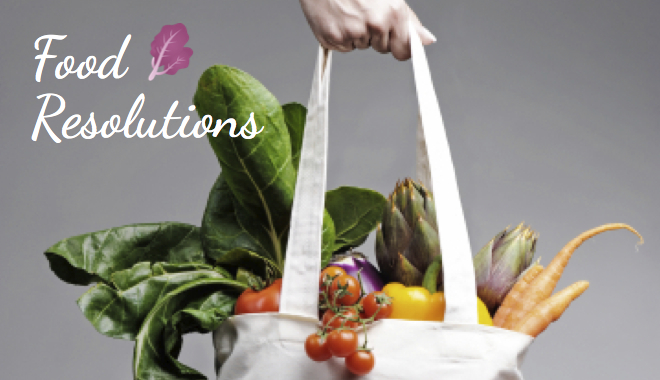Everyone always asks me what my New Year’s resolutions are. I set many intentions for the new year. To be healthier is a mainstay of mine. It is a mindset. Food doesn’t just come from the grocery store. Stop and really think where it grows and how what we do with it effects our bodies and the planet on every level. Only then can we have a healthy relationship with food where nutrients matter more than calories. These food resolutions will help you in this profound shift in mindset.
1. Slash Your Sugar Consumption
In 10 years it will be sugar locked up behind the counter where cigarettes are sold. Sugar, more than anything—fat, meat, dairy, good carbs, bad carbs—are the #1 culprit for stealing our health and robbing us of our well-deserved vitality. It’s hidden in almost everything—salad dressings, yogurts, sauces, marinades, condiments, breads, pastas—wears many masks and is dressed up in many costumes. See my full list here (and ways to beat those sugar cravings.) The best thing to do for yourself is start slashing your sugar consumption. Read labels, be more mindful of where the sugar hides. You will get your energy back and even shed a few pounds. Isn’t it time you broke up with sugar? Here’s an extra kicker to kick that sugar habit.
2. Shop at your Local Farmer
Meeting your local farmer puts a face to where your food comes from and creates a connection between farmers and consumers. You can actually visualize where your food is coming from and how it is produced. You will feel good about the food you are eating.
3. Eat Seasonal Produce
By purchasing local foods that are in season, you can help reduce the environmental impact of shipping food. And your money goes straight to the farmer, supporting the local economy. Food is fresher, and tastes how it should taste. Have you noticed how tomatoes taste in winter, pretty much like nothing. Winter produce is incredibly grounding and warming. Try this savoury roasted soup to warm the soul.
4. End Food Waste
More than 1.3 billion tons of edible food is wasted each year. Tips to reduce waste: plan meals ahead; get more creative with recipes; request smaller portions or when dining out take half home; compost; make veggie stock (all veggie parts not eating: end of onions, carrots, broccoli stalks, etc keep in container. When full put in pot cover with water add salt and boil for an hour.) Have you ever noticed when how satisfying it feels not to waste food? Make it a habit.
5. Buy (or Grow) Organic
The Environmental Working Group (EWG) has found that at least one pesticide is in %67 of produce samples in the US. Studies suggest that pesticides are linked to cancers, degenerative diseases, infertility, can interfere with brain development in children and can harm wildlife (to name a few.) Growing and eating organic and environmentally sustainable produce, we can help protect our bodies and natural resources.
6. Eat Less Meat
For your health and the health of the planet. Just for a level, one pound of beef requires 1,799 gallons of water. Think about that for a moment. Meat has a huge water footprint, are resource intensive and pollute the earth. Change your mindset, your DO NOT need meat on your plate. We do get enough protein from other foods. There is protein in greens, cook with beans, use hemp.
7. Cook
In Michael Pollan’s book, Cooked, he learns how the four elements—fire, water, air, and earth—transform parts of nature into delicious meals. And he finds that the art of cooking connects both nature and culture. Eaters take back control of the food system by cooking more and, in the process, strengthen relationships and eat more nutritious—and delicious—foods. Make something from nothing. A well stocked refrigerator is an indicator of a happy home.
8. Have a Dinner Party
Nourish your friends. Eat a healthy meal together. Or make a couple healthy delicious appetizers. Connect, laugh and engage. Talk about food and encourage conversation around creating a better food system.
9. Consider the “True Cost” of Your Food
Based on the price alone, inexpensive junk food often wins over local or organic foods. But the price tag doesn’t tell the whole story. True cost accounting allows farmers, eaters, businesses, and policymakers to understand the cost of all of the “ingredients” that go into making fast food—including antibiotics, artificial fertilizers, transportation, and a whole range of other factors that don’t show up in the price tag of the food we eat. But really organic food is not more expensive then non. A box of 6 Quaker Oats granola bars is about $4.50. 6 organic peppers is about the same price. What’s healthier? What’s a better snack? Which is more versatile? What’s gonna make you feel vibrant and alive? Which one helps you? Which one hinders you?

